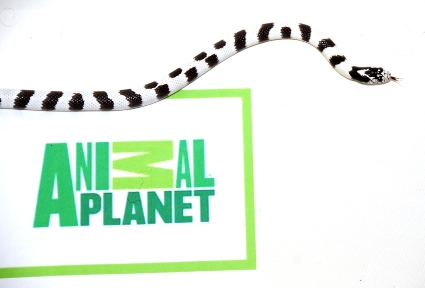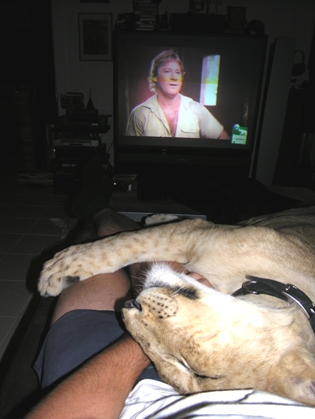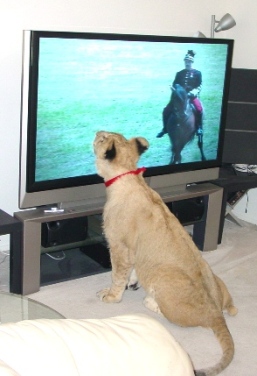
Are Animal Television Networks Tumbling into the Toilet?
By Eric Roscoe, October 2010

There is no doubt that for many years, and quite possibly decades, animal and nature oriented television networks including Discovery Channel, National Geographic Channel, and Animal Planet for example, have long served as memorable, reliable, and entertaining sources of information for all individuals and families alike. This has typically been achieved through the airing of many well known programs and individuals such as Steve Irwin and his loving family/co-workers, Mark O’Shea, and Jeff Corwin to name a few. Within these programs, these noble animal and environmental educators constantly stressed the importance of becoming aware of, learning about, and ultimately respecting animals, nature, and the environment.
 However, over last several recent years, a disturbing and appalling new
trend has emerged within these television networks, as well as many others,
that has slowly but steadily replaced the aforementioned types of
programming that so many people love and enjoy. This “new generation” of
television programming now focuses far more heavily on exploiting and
appealing to the human’s rudimentary senses or emotions such as fear. To
illustrate such a classic example, according to Anne Beck, Animal Planets
self described “relaunch” has stated the following in February 2008:
“The goal is to move from being perceived by viewers as paternalistic,
preachy, and observation-based to being seen as active, entertaining and
edgy. That means targeting adults 25-49, rather than full families, with
less voice-of-God narration, and more visceral imagery and sounds. Think of
it as swapping a drab narrator saying that a lion is about to kill its prey
for the blood-curdling scream of the doomed creature as it meets its demise.”
However, over last several recent years, a disturbing and appalling new
trend has emerged within these television networks, as well as many others,
that has slowly but steadily replaced the aforementioned types of
programming that so many people love and enjoy. This “new generation” of
television programming now focuses far more heavily on exploiting and
appealing to the human’s rudimentary senses or emotions such as fear. To
illustrate such a classic example, according to Anne Beck, Animal Planets
self described “relaunch” has stated the following in February 2008:
“The goal is to move from being perceived by viewers as paternalistic,
preachy, and observation-based to being seen as active, entertaining and
edgy. That means targeting adults 25-49, rather than full families, with
less voice-of-God narration, and more visceral imagery and sounds. Think of
it as swapping a drab narrator saying that a lion is about to kill its prey
for the blood-curdling scream of the doomed creature as it meets its demise.”
As a result, viewers of these networks are now being exposed to a far
greater number of programs and series emphasizing largely to entirely on
wild and captive animal maulings, attacks, fatalities, escapes, and other
animal related incidents/accidents. A significant portion of these
depictions include and depict reptiles and other captively held exotic
animals including but not limited to primates, big cats, and non non
domesticated canines, and the subsequent keeping/ownership of said animals as
posing as serious threats to human health and physical safety. At the same
time, very little to no information is typically presented that can be
considered to be of actual educational value. These programs however, only
emphasize upon the negative rare events, and often fail to even mention the
positives, as well as attempt to place depicted scenarios into the proper
context therefore presenting a distorted overall image of what animal
ownership entails. Unfortunately this is likely due to the fact that such
perspectives are often far less shocking and visually appealing/stimulating
to the uninformed general public who view such programs.
In even more recent years, another new and disturbing trend and emphasis
has emerged in the television networks and media; the concept of animal
hoarding and its applications thereof. In perhaps the most widely known
sense, animal hoarding truly occurs when an individual continually acquires
and keeps very large quantities of animals, while at the same time fails to
be able to physically and/or financially keep their animals in a proper,
sanitary, and responsible manner. Some of these individuals may even not
realize the implications of their actions, and as such many believe that
“animal hoarding” is associated with several psychological disorders.
 While there are undoubtedly individuals and situations/circumstances where
animal hoarding truly does occur, the concerning trend lays in these
television network’s (most notably Animal Planet’s) seemingly widespread
misuse and loose applications of the term “animal hoarding”. In recent weeks
and months, it has come to my attention (as well as many other’s) that one
to several recruiters allegedly representing the Animal Planet network have
approached several large scale, well known and respected individuals within
our industry, as well as having posted solicitations on many different pet
and animal forums and websites encouraging individuals to be recruited into
participating in their new television series. The apparent presumptions of
these recruiters and network therefore reasonably appears to be that we as herp hobbyists, pet owners, and breeders are also viewed as animal hoarders
in need of psychological assistance, and/or intervention. As to my knowledge,
these networks have not as of yet attempted to make such fundamental
distinctions.
While there are undoubtedly individuals and situations/circumstances where
animal hoarding truly does occur, the concerning trend lays in these
television network’s (most notably Animal Planet’s) seemingly widespread
misuse and loose applications of the term “animal hoarding”. In recent weeks
and months, it has come to my attention (as well as many other’s) that one
to several recruiters allegedly representing the Animal Planet network have
approached several large scale, well known and respected individuals within
our industry, as well as having posted solicitations on many different pet
and animal forums and websites encouraging individuals to be recruited into
participating in their new television series. The apparent presumptions of
these recruiters and network therefore reasonably appears to be that we as herp hobbyists, pet owners, and breeders are also viewed as animal hoarders
in need of psychological assistance, and/or intervention. As to my knowledge,
these networks have not as of yet attempted to make such fundamental
distinctions.
To conclude, It is certainly understood that one of the objectives of
most, if not all, television and media networks is to increase their
viewership and subsequent ratings. However, the implications extend far
beyond providing simple entertainment value alone for viewers. Such
widespread and reckless use and perpetuation of many outright myths,
stereotypes/prejudices, and misinformation by these and other media networks
is (and should be considered) not only incredibly irresponsible programming,
but is also a direct undoing of the tireless educational efforts of the late
Steve Irwin and others as well as thousands of passionate and dedicated
reptile hobbyists worldwide who strive to educate the public about these
animals on a daily basis. These programs are performing a great disservice
that is contrary to the efforts and goals of all of these individuals. At
some point, these formerly reputable networks need to once again begin to
care about more than the almighty dollar alone.
Due to the tremendous influence these networks have established, WE as the
reptile and exotics keeping community cannot and should not afford to ignore
these increasingly direct attacks on our hobby/industry by these prominent
networks. There now appears to be a highly disturbing similarity between
many of these programs and the Humane Society of the United State's (HSUS's)
agenda to obliterate the reptile industry. Whether you enjoy it or not, WE
must actively respond to and address this matter, for simply ignoring it by
burying our heads in the sand while being stoned to death, has clearly proven
ineffective thus far in combating these types of heavily sensationalized
programs.
To find out more
about Eric Roscoe, visit his website
Specialty Serpents
Photo Copyright © 2010 REXANO
Content copyright © 2010 by
Eric Roscoe. All rights reserved.
www.REXANO.org